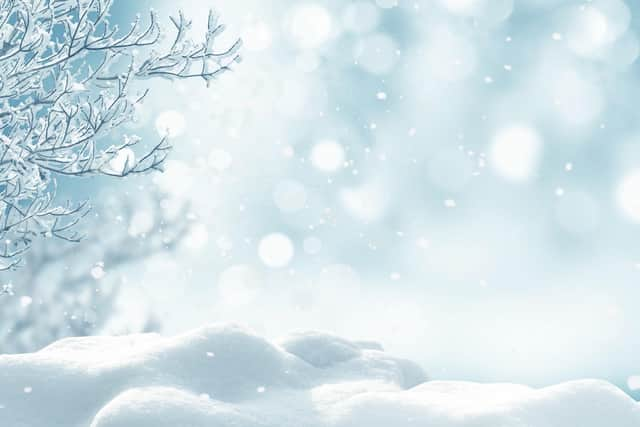The North West has a 1 in 10 chance of a white Christmas due to ‘polar air’ blast
and live on Freeview channel 276
Global meteorologist Jim Dale revealed that: “As the main adjudicator for bookmakers as to whether a location has received a snowflake or some sleet in the 24 hours of Christmas Day, historic data suggests that there’s a 1 in 10 chance of having a white Christmas this year, based on London climate.”
After missing out on a white Christmas last year despite predictions of a ‘snowbomb’ in the North West region as a result of several storms throughout the year, the chances of a white Christmas in the region are back.
Advertisement
Hide AdAdvertisement
Hide AdAn increased chance of rain means an increased chance of snow if temperatures are low enough, with the heaviest snowfalls occurring when the air temperature is between 0-2°C .


We’re certainly on track to record these temperatures sooner rather than later, with a chilly ‘polar air’ blast having already started hitting the UK last Friday, leading the Met Office to forecast snow for some areas already.
This predicted cold snap could see snowflakes starting to fall as early as late October - which could see many Brits resorting to putting their heating on already, despite rising costs.
According to Mr Dale - British Weather Services founder - some parts of the nation are considerably more likely to experience a snowy Christmas than others, with the Highlands and Grampian regions of Scotland expected to see the most snow generally this year.
Advertisement
Hide AdAdvertisement
Hide AdWhilst Highland destinations Skye, Inverness and Glencoe are amongst the most likely to see snow this winter, Cornwall is the least likely, averaging just 7.4 days of snow each year.
The commentary - provided as part of the Wettest Regions Study - also found that the nation is more likely to see unpredictable weather this winter as a result of the record-breaking temperatures experienced in June and July - with temps soaring over 40°C back in July.
When asked when else we can expect to see snow, Jim Dale said: “I expect the winter to deliver snow in fits and starts, focused January through February. It’s more likely we’ll see a rainy Christmas rather than a snowy one, though it’s also more likely overall that we see a dry Christmas over a wet one.”
However, the soaring temperatures experienced this summer could mean a wet winter is firmly on the cards, with Jim Dale saying: ““I’m a big believer in Mother Nature’s ability to level up. Dry summers can and often do lead to wetter autumns and winters.”
Advertisement
Hide AdAdvertisement
Hide AdA white Christmas isn’t too hard to achieve, given there only needs to be a single snowflake falling within 24 hours of December 25 at one of the 13 major airports in the UK for it to be classed as a White Christmas. And, the snow doesn’t technically even need to settle.
The snowiest winter of the twentieth century in the United Kingdom was 1947, when between 22 January and 17 March, snow fell every day somewhere in the country.